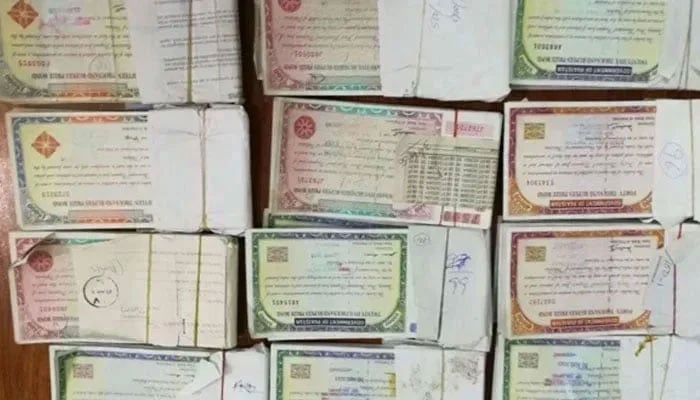Govt targets to raise Rs8.7tr via T-bills and bonds auctions
KARACHI: The government intends to raise Rs8.7 trillion by selling Treasury bills and bonds from November to January to meet its budgetary needs and refinance debt.
The government aims to raise Rs5.5 trillion through short-term papers or market T-bills auctions with maturities of three, six, and 12 months. Moreover, the government plans to sell fixed and floating rate Pakistan Investment Bonds (PIBs) with maturities of two, three, five, and 10 years to borrow Rs3.2 trillion from commercial banks, the auction result issued by the State Bank of Pakistan (SBP) showed on Thursday.
The total maturity amount for T-bills and PIBs during the three months from November to January is projected to be Rs6.85 trillion.Saad Hanif, head of research at Ismail Iqbal Securities, said that the auction target indicates the government’s borrowing needs to meet higher fiscal demands, debt refinancing requirements, or economic stabilisation measures.
The SBP issued a monetary policy statement on Monday that noted a significant decline in net budgetary borrowing from the banking system, while at the same time, banks’ credit to the non-government sector has increased. Following the receipt of profits from the SBP, the government has reduced its borrowing from banks and initiated buy-back operations for its outstanding debt securities.
This has created additional capacity for banks to extend credit to the private sector. Additionally, there has been a notable decrease in the State Bank’s liquidity injections, as evidenced by a reduction in the outstanding stock of open market operations.
According to the SBP, the overall debt stock has declined, and debt composition has improved. The total external debt has witnessed a reduction from $100 billion at the end of FY22 to $98.3 billion at the end of FY24. In addition, the maturity profile of these debts has also improved due to the increase in the share of multilateral debts. The domestic outstanding debt profile has also improved as the share of short-term T-bills has declined to 21 per cent in four months of FY25, compared with 24 per cent at the end of FY24. The authorities expect this share to go below 20 per cent by the end of FY25.
Analysts anticipate a likely decline in yields across all tenors in the upcoming T-bills and PIBs auction next week, following a historic rate cut by the SBP on Monday. The SBP’s Monetary Policy Committee has reduced its key interest rate for the fourth consecutive meeting, lowering it by 250 basis points to 15 per cent.
On Wednesday, the government raised Rs331.7 billion from the Ijara Sukuk auction, surpassing the target of Rs300 billion. The yield on the one-year Sukuk has decreased to 10.9 per cent.
According to the SBP, the reduction in interest rates and the timely use of surplus funds for debt profiling are expected to significantly lower the government’s debt servicing costs in fiscal year 2025.
The government’s total interest expense for FY25 is now estimated to be Rs8.5 trillion, compared with Rs9.8 trillion projected in the budget for the current fiscal year. This reduction results in total savings of Rs1.3 trillion, which is approximately 1.0 per cent of gross domestic product (GDP), thanks to the cuts in interest rates. These savings will aid in controlling the fiscal deficit for FY25.
The SBP believes that continued fiscal consolidation will positively impact debt sustainability. In the first quarter of FY25, both the fiscal and primary balances recorded surpluses of 1.4 per cent and 2.4 per cent of GDP, respectively. This improvement can largely be attributed to record-high profits from the SBP, which significantly boosted non-tax revenues. However, the Federal Board of Revenue’s tax collection fell short of targets during the July-October period, as noted in the SBP’s monetary policy statement.
-
 Everything We Know About Jessie J's Breast Cancer Journey
Everything We Know About Jessie J's Breast Cancer Journey -
 Winter Olympics 2026: What To Watch In Men’s Hockey Today
Winter Olympics 2026: What To Watch In Men’s Hockey Today -
 Winnie Harlow Breaks Vitiligo Stereotypes: 'I'm Not A Sufferer'
Winnie Harlow Breaks Vitiligo Stereotypes: 'I'm Not A Sufferer' -
 Apple Martin Opens Up About Getting 'crazy' Lip Filler
Apple Martin Opens Up About Getting 'crazy' Lip Filler -
 Why Did OpenAI Remove One Crucial Word From Its Mission Statement?
Why Did OpenAI Remove One Crucial Word From Its Mission Statement? -
 Prince William Warned His Future Reign Will Be Affected By Andrew Scandal
Prince William Warned His Future Reign Will Be Affected By Andrew Scandal -
 Amy Madigan Reflects On Husband Ed Harris' Support After Oscar Nomination
Amy Madigan Reflects On Husband Ed Harris' Support After Oscar Nomination -
 Is Studying Medicine Useless? Elon Musk’s Claim That AI Will Outperform Surgeons Sparks Debate
Is Studying Medicine Useless? Elon Musk’s Claim That AI Will Outperform Surgeons Sparks Debate -
 Margot Robbie Gushes Over 'Wuthering Heights' Director: 'I'd Follow Her Anywhere'
Margot Robbie Gushes Over 'Wuthering Heights' Director: 'I'd Follow Her Anywhere' -
 'The Muppet Show' Star Miss Piggy Gives Fans THIS Advice
'The Muppet Show' Star Miss Piggy Gives Fans THIS Advice -
 Sarah Ferguson Concerned For Princess Eugenie, Beatrice Amid Epstein Scandal
Sarah Ferguson Concerned For Princess Eugenie, Beatrice Amid Epstein Scandal -
 Uber Enters Seven New European Markets In Major Food-delivery Expansion
Uber Enters Seven New European Markets In Major Food-delivery Expansion -
 Hollywood Fights Back Against Super-realistic AI Video Tool
Hollywood Fights Back Against Super-realistic AI Video Tool -
 Meghan Markle's Father Shares Fresh Health Update
Meghan Markle's Father Shares Fresh Health Update -
 Pentagon Threatens To Cut Ties With Anthropic Over AI Safeguards Dispute
Pentagon Threatens To Cut Ties With Anthropic Over AI Safeguards Dispute -
 Samsung Galaxy Unpacked 2026: What To Expect On February 25
Samsung Galaxy Unpacked 2026: What To Expect On February 25




